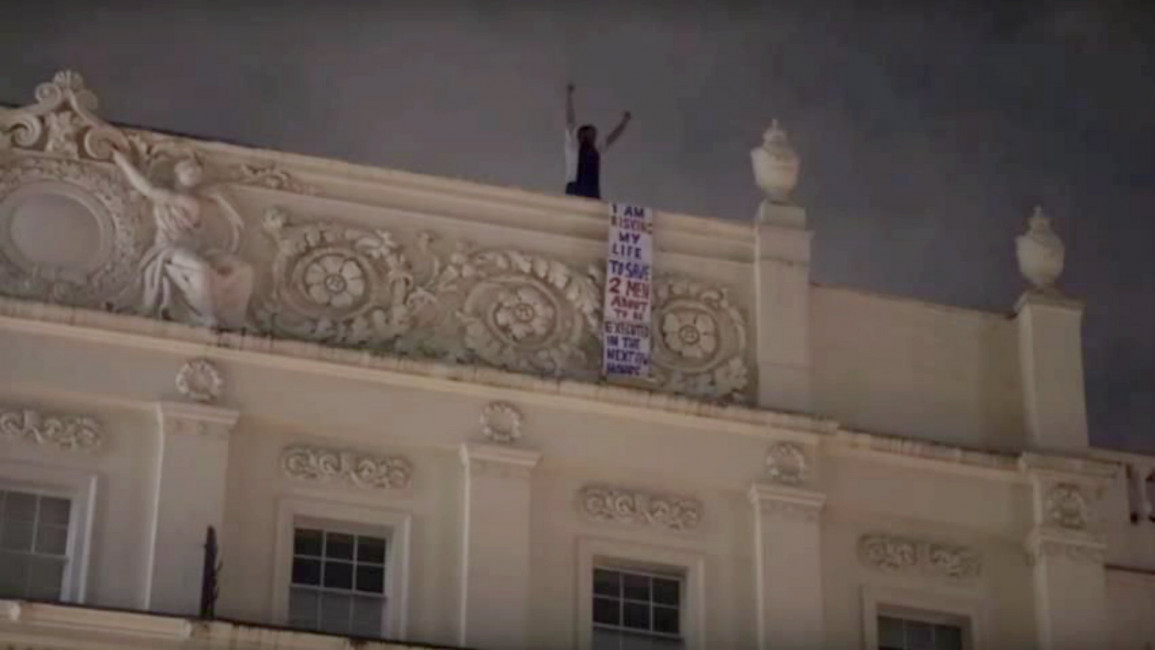Bahraini dissident feared becoming 'second Jamal Khashoggi' during dramatic embassy rooftop incident
Bahraini dissident Moosa Mohamed said on Wednesday that he feared being thrown from the roof of his country's embassy when officials last month threatened him with "execution".
Mohamed climbed the roof of the Bahraini embassy in London in July as part of a protest against the scheduled executions of two fellow Bahraini dissidents.
In a video of the dramatic incident posted on social media, an embassy security guard can be seen assaulting Mohamed as he sat on the edge of the five-story building.
The shocking footage then shows British police breaking down the door of the embassy to retrieve the activist from inside the Belgravia building.
The activist told The Guardian that he feared he could have become a "second Jamal Khashoggi", referring to the Saudi journalist who was brutally murdered and dismembered in the Saudi consulate in Istanbul last year.
Speaking publicly for the first time, Mohamed said an embassy official had pushed him while he was sitting on the edge of the roof and then hit him with a metre-long plank of wood.
According to the protester, the embassy staffer then told him: "We have two people being executed in Bahrain and you will be the third."
Mohamed scaled the embassy to demand that UK authorities intervene to stop the execution of Ali al-Arab and Ahmad al-Malali, who rights groups say were convicted unfairly.
Calls for the execution to be stalled by Mohamed and other human rights advocates were ultimately unsuccessful.
A 22-year-old Bahraini activist also died while protesting against the executions on the island kingdom. Opposition media said he had died as a result of inhaling tear gas.
"I believed at the time he was trying to push me off the roof without anyone seeing that he had done this, so that it would look like I had fallen down by accident, or I had jumped off the roof," Mohamed said.
|
|
He also alleged that another embassy staffer had told him that no one would help him as he was on "Bahraini land".
Once the police officers entered the building, the incident ended.
Mohamed was later arrested for aggravated trespass, but was released on bail shortly after the incident.
He is preparing to make a complaint to the London Metropolitan Police with the help of law firms Bindmans and fellow activists, and ask them to investigate the alleged assault.
In a statement on Wednesday, the Bahraini embassy praised its staff for responding to the incident with "professionalism and courage", accusing Mohamed of "unlawfully trespassing".
"An objective view of this incident would determine that peaceful and lawful protest does not take place on the roof of a diplomatic premises at 10:30pm," it said.
The embassy refuted allegations that embassy staff were "trying to kill" Mohamed, calling the claims "completely unfounded and ridiculous".
But Mohamed told The Guardian that, in a second phase of the struggle, embassy staff had held him down and attempted to suffocate him with a wet t-shirt.
"I couldn't breathe. I felt like I was being suffocated and I was going to die," he said.
When he managed to wriggle free of their grasp, the two embassy staffers then allegedly tried to tie his hands with a cable.
One of the men then threatened to "tie him and throw him like a sheep down the stairs", Mohamed claimed.
Footage filmed by other activists shows Mohamed limping as he left the embassy. A medical examination in a London clinic to days after the incident documented bruise marks on his forearms and left leg.
Mohamed has also called on Foreign Secretary Dominic Raab to expel Bahrain's ambassador from the UK.
"It is irrelevant whether this happened under his direction or this happened under his leadership. Otherwise Britain will be like a jungle, that people could do whatever they want," he said.
Mohamed left Bahrain and was given asylum in the UK in 2006 after being repeatedly detained and harassed by the Bahraini authorities for his activism.



